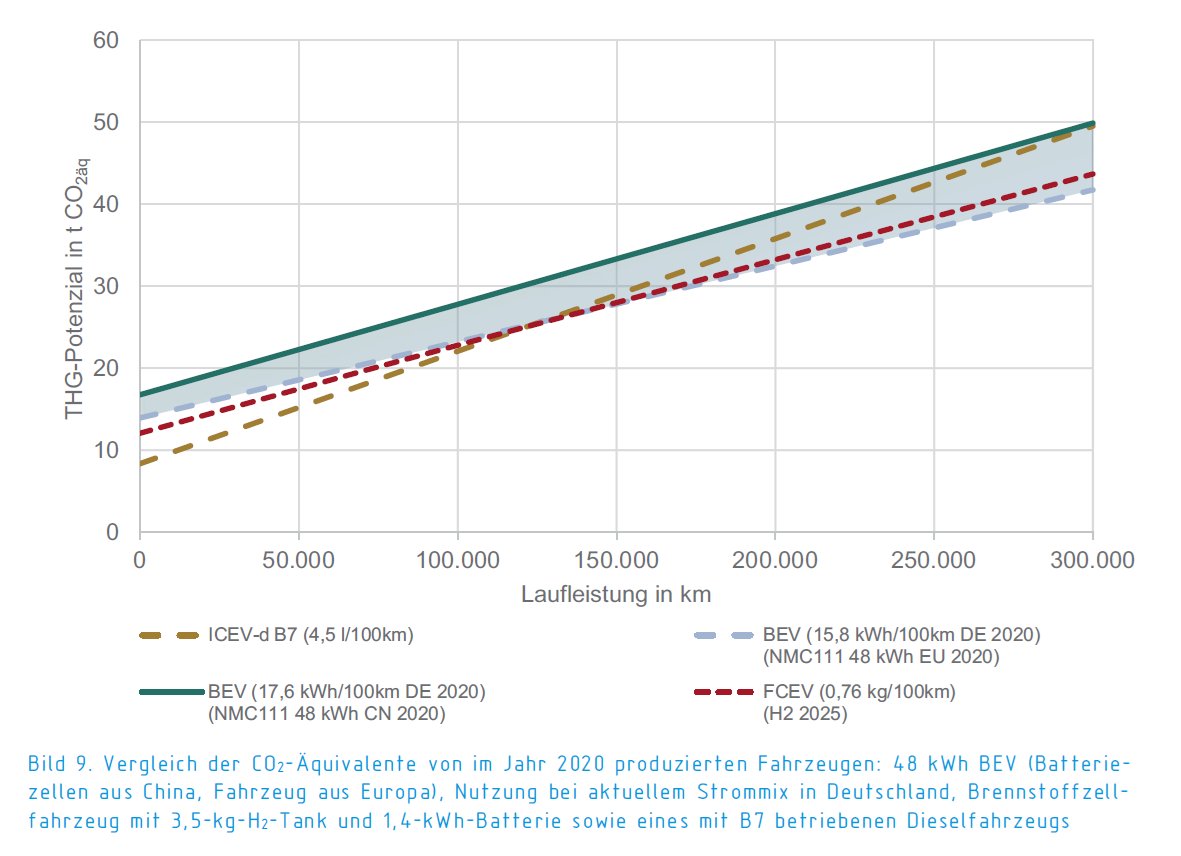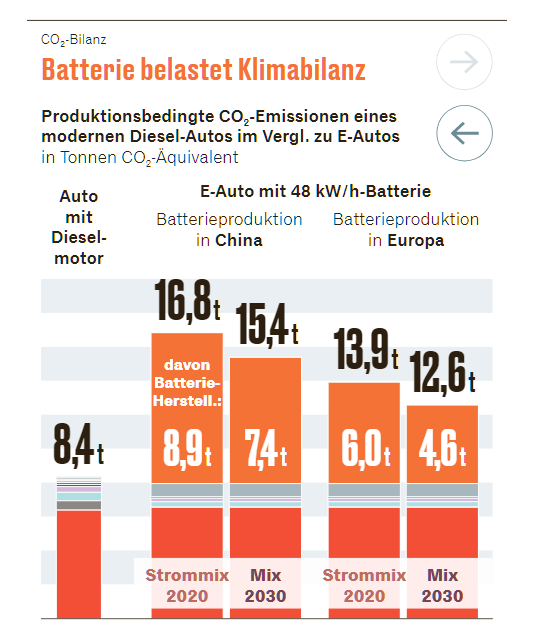
But lo and behold: this 2017 study was updated by the authors themselves in 2019 and what did they conclude?
Emissions between 61 and 106 kg CO2eq/kWh.
It's hard to overstate how outdated it makes this 'new' study by VDI. And I'm disappointed that @handelsblatt didn't see this.
Emissions between 61 and 106 kg CO2eq/kWh.
It's hard to overstate how outdated it makes this 'new' study by VDI. And I'm disappointed that @handelsblatt didn't see this.

Of course battery emissions will continue to go down (also - not surprisingly - faster than VDI assumes) as production becomes optimised further and as renewable electricity is used in mining and factories.
Basically emissions of EVs can go down to zero.
sciencedirect.com/science/articl…
Basically emissions of EVs can go down to zero.
sciencedirect.com/science/articl…

By now most people know 90% of biofuels are a bad idea and they are best reserved for hard problems like aviation.
But combustion engine proponents have one last trick up their sleeve: eFuels!
The idea is simple: go to other countries and produce fuel using green electricity.
But combustion engine proponents have one last trick up their sleeve: eFuels!
The idea is simple: go to other countries and produce fuel using green electricity.

Problem: eFuels are expensive and inefficient: you need almost six times more windmills or solar panels.
But the idea is so bring solar panels to sunny countries where they produce 2-3x more electricity and transport eFuel here with oil tankers, just like in the good old days.
But the idea is so bring solar panels to sunny countries where they produce 2-3x more electricity and transport eFuel here with oil tankers, just like in the good old days.

Even then you would still need much more energy production and other price increasing machines and steps. And you create investments, jobs and profits elsewhere (as with oil).
I think you can only believe in eFueled cars if you are unwaveringly loyal to the combustion engine.
I think you can only believe in eFueled cars if you are unwaveringly loyal to the combustion engine.
There's more I might dive into when the report and all its sources become available. For now remember that the battery number in de VDI study is around 2.5x too high which completely invalidates the result.
I hope VDIs work on combustion engines is less error prone.
I hope VDIs work on combustion engines is less error prone.
Could you help out and tag this thread to any tweet mentioning the VDI study? I only see these tweets promoting the VDI study when they tag me (which is not often). Let's stop some #fakenews in its tracks.
Dinner was great, on we go because we are not done.
First housekeeping: forgot to link to the original @handelsblatt article: handelsblatt.com/politik/deutsc…
And here's the link to the study:
vdi.de/ueber-uns/pres…
First housekeeping: forgot to link to the original @handelsblatt article: handelsblatt.com/politik/deutsc…
And here's the link to the study:
vdi.de/ueber-uns/pres…
VDI goes all in on error 4 (see my study): underestimate energy use by relying on tests paid for the manufacturers.
VDI assumes 4.5l/100km but if we look at the energy use of e.g. the VW Golf Diesel using spritmonitor.de we get 5.7l:
27% more. spritmonitor.de/de/uebersicht/…
VDI assumes 4.5l/100km but if we look at the energy use of e.g. the VW Golf Diesel using spritmonitor.de we get 5.7l:
27% more. spritmonitor.de/de/uebersicht/…

Also (error 5), they seem to assume diesel production adds just 16% CO2 when it is closer to 24%.
(Fig 9 shows 42t for 300k km.
42 000 000 g / 300 000 km = 140 g/km.
@ 0.045l/km.
140/0.045=3111g/l.
Diesel itself emits 2680g/l.
3111/2680=1.16 => 16% more.)
https://twitter.com/aukehoekstra/status/1229108129301921792?lang=en
(Fig 9 shows 42t for 300k km.
42 000 000 g / 300 000 km = 140 g/km.
@ 0.045l/km.
140/0.045=3111g/l.
Diesel itself emits 2680g/l.
3111/2680=1.16 => 16% more.)

For EV's they commit to error 3 by assuming the EV will drive on the same electricity mix in 2030 as when it was bought in 2020. But this is simply not true: if you drive on the average mix, your EV gets cleaner as it gets older. 

Instead of the 250g/kWh over the lifetime of the car in Europe they assume 590g/kWh. That's high for 2020 but ludicrous for the 2020-2040 period.
Even if we take the currently higher German emissions into account, 300g/kWh over the EV lifetime is conservative.
Even if we take the currently higher German emissions into account, 300g/kWh over the EV lifetime is conservative.
Energy use of a VW eGolf is 0.153 according to the WLTP, 0.14 kWh/km according to spritmonitor.de, and 0.17 kWh/km according to the EPA.
Let's take the highest value of 0.17 kWh/km to stay on the conservative side.
Let's take the highest value of 0.17 kWh/km to stay on the conservative side.
Now let's correct the graph of VDI.
First let's assume the diesel uses 5.7l/100km (instead of the unrealistic WLTP value of 4.5l) and diesel production adds 24% emissions (for a total of 3310 g CO2/l).
The diesel line becomes a lot steeper with these realistic assumptions!
First let's assume the diesel uses 5.7l/100km (instead of the unrealistic WLTP value of 4.5l) and diesel production adds 24% emissions (for a total of 3310 g CO2/l).
The diesel line becomes a lot steeper with these realistic assumptions!

Now let's make the EV realistic:
Battery 8.9t => 3.6t lowers the starting point to 8+3.6=11.6t.
Energy use of 0.17kWh/km x 300g/kWh x 300k km = 15.3t is added over 300k km.
De end result is a break even point around 25k km!
Battery 8.9t => 3.6t lowers the starting point to 8+3.6=11.6t.
Energy use of 0.17kWh/km x 300g/kWh x 300k km = 15.3t is added over 300k km.
De end result is a break even point around 25k km!

@VDI_News didn't ask just any groep at the @KITKarlsruhe to conduct this study. If you dig you find all authors work for the IFKM: the institute for piston engines whose mission is to develop combustion engines further.
Looking for an certain outcome VDI?
Looking for an certain outcome VDI?
https://twitter.com/EnergyPst/status/1323391604082855942
If you would rather hear me talk about this than read a thread...
Here I am explaining it in an @elaadNL lecture:
Here I am talking about these things over a beer with @MLiebreich
Here I am explaining it in an @elaadNL lecture:
Here I am talking about these things over a beer with @MLiebreich
https://twitter.com/AukeHoekstra/status/1323325638829367300?s=20
One recurring theme is "cells are made in China with coal and that emits enormous amounts of CO2. (VDI assumes 185 kg CO2/kWh battery.)
But:
1) Most improvement in recent years is due to efficiency gains in cell production. Even using coal a modern factory is <125kg/kWh.
But:
1) Most improvement in recent years is due to efficiency gains in cell production. Even using coal a modern factory is <125kg/kWh.
2) Very few cells sold in Europe are produced in China. And even when Chinese CATL produces a small amount of them, it does so largely in Europe. @Stefan_Hajek will publish on that shortly and here's a German thread that made me tweet this.
https://twitter.com/GenerationStrom/status/1323553783453024256?s=19
Here @DennisKopljar and others verify my conclusions.
I don't have a different *opinion* from @VDI_News and IFKM (the combustion engine institute that did the study)!
I point out they use outdated sources which invalidates their results: they are wrong.
I don't have a different *opinion* from @VDI_News and IFKM (the combustion engine institute that did the study)!
I point out they use outdated sources which invalidates their results: they are wrong.
https://twitter.com/DennisKopljar/status/1323952113735684097?s=20
Pity that @heiseonline simply spreads the misinformation from the error prone @VDI_News / IFKM study. But at least they refer to my study at the end ;-(
heise.de/news/VDI-zu-El…
heise.de/news/VDI-zu-El…
• • •
Missing some Tweet in this thread? You can try to
force a refresh









